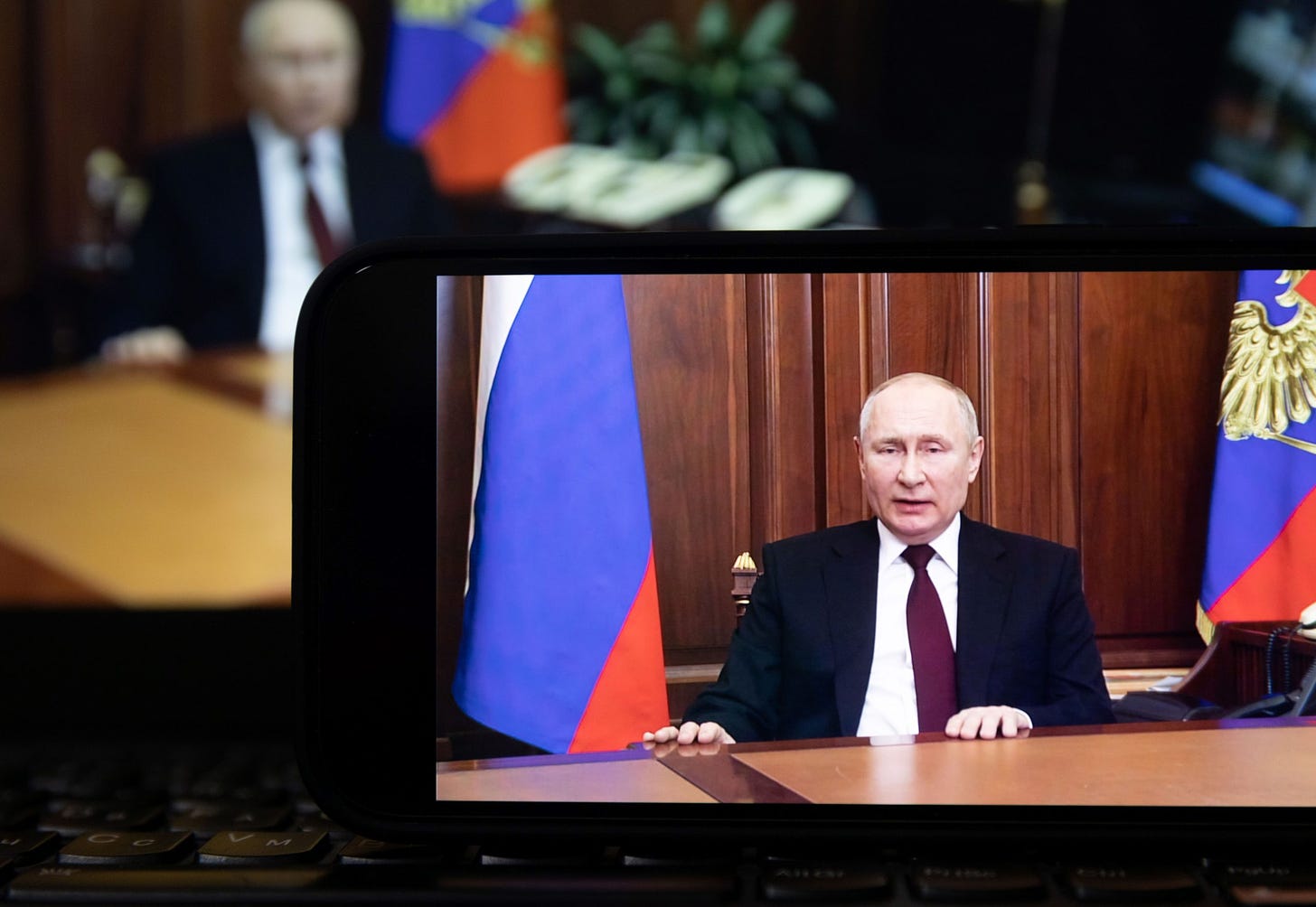How Putin Conned the American Right
He carefully planted the seeds for his popularity among conservatives.

If you could hop in a time machine, buckle up, and pop back three decades—or even just one—and tell a loyal Republican of yesteryear that prominent American conservatives in 2022 would admire and defend the former KGB officer who rules Russia, you would be met with disbelief. Yet here we are:

Now that the world has seen the brutality and horror of the Russian invasion of Ukraine, much of Putin’s fan base on the American right has either become “anti-anti-Putin” or gone quiet altogether. But it’s worth taking a moment to look back at what attracted them to the dictator in the first place. Doing so helps us to see that Putin’s American stans are not savvy observers of the international scene, but gulls. Putin has long been positioning himself as the leader of global cultural conservatism, but not because he believes in the policies and ideas. He simply understands their value to him in domestic and international politics.
Consider his surreal televised speech on March 25, during which he said that “the proverbial ‘cancel culture’ has become the cancellation of culture” while invoking the criticism of Harry Potter creator J.K. Rowling. He gave a similar speech as recently as February, echoing the talking points of American conservatives in his warnings against an assault on “basic things such as mother, father, family or gender differences.” These resonances didn’t come as a surprise to Kremlin watchers, who know that Putin, who often literally cancels his adversaries, doesn’t give a fig about figuratively “canceling” authors or about any kind of decency. But many on the American right have loved his shtick for years.
Putin made his first moves in the direction of conservative cultural leadership in 2013. The previous year, President Barack Obama had put social conservatives on a defensive footing by coming out in favor of gay marriage. Then, in 2013, the Supreme Court agreed to hear United States v. Windsor. Six weeks after the oral argument, the Russian Duma passed what would come to be known as the “anti-gay law,” but Putin didn’t sign the bill into law immediately. He let it sit on his desk for three weeks. Days after the Supreme Court struck down the Defense of Marriage Act, he signed it into law.
Later in 2013, a Kremlin-connected Russian think tank called the Center for Strategic Communications published a report titled, “Putin: World Conservatism’s New Leader.” The document repeated populist talking points that would prove influential during the 2016 presidential election. It rejected “ideological experiments” and called for social stability and conservative family values instead. It characterized immigration as a threat to the nation-state, and it framed Putin as a defender of sovereignty.
Days after the report was published, Putin gave his annual State of the Nation address to the Duma. His speech centered on the report’s conclusions, and gay marriage featured prominently:
We know that there are more and more people in the world who support our position on defending traditional values that have made up the spiritual and moral foundation of civilization in every nation for thousands of years: the values of traditional families, real human life, including religious life, not just material existence but also spirituality, the values of humanism and global diversity.
The speech made Putin an icon in segments of the right. Pat Buchanan and Franklin Graham wrote op-eds praising him as a new standard-bearer for Christian values. Graham even traveled to Moscow to meet him. Christian groups such as the World Congress of Families began developing stronger associations with Russia, and conservatives on social media began to publicly express support for Putin as an avatar of social conservatism.
In 2019, the Center for Social and Conservative Policy, another Kremlin-connected think tank, published a report that identified “the leading role of culture in social development [as] a landmark point of Putin’s political philosophy.” Putin went on the offensive soon after. In an interview with the Financial Times, he questioned social changes in the West, using them as evidence for liberal democracy’s weakness, and called for a return to traditional social values—“biblical” values—instead.
Putin has also exploited conservatives’ anxieties about the retreat of masculinity in the West. Pictured shirtless on a horse or doing judo, he has created an image of himself as a strong, masculine leader. Even his military campaign in Syria played a role. While his targets were mostly the secular opposition to Bashar al-Assad, Putin’s propaganda machine portrayed the campaign as a decisive leader’s war against Islamist extremists. The contrast with the West was pronounced: The United States kept its operations against the Islamic State limited and its profile low to avoid getting mired in the Syrian civil war.
Putin’s information strategy is a continuation of the old Soviet information strategy. It prioritizes a large variety of low-cost operations; efforts and resources are multiplied for whichever works best. And just like the Soviet regime before it, Putin’s regime is impotent in understanding American politics, but it is well versed in understanding American societal divisions—and how to exploit them.
For years, Putin’s strategy seemed to pay off, as a segment of writers and magazines and broadcasters on the American right praised him, or at least took it easier on him than they otherwise would have. But the war in Ukraine has shown the limits of Putin’s soft power: An overwhelming majority of Americans object to Russia’s invasion and view the Russian leader as a menace and a pariah. But his erstwhile supporters on the American right, now gone mostly quiet, could prove themselves gulls again if Putin’s media specialists attempt a rehabilitation campaign. This possibility proves that Putin’s efforts to court social conservatives were not a total waste.


